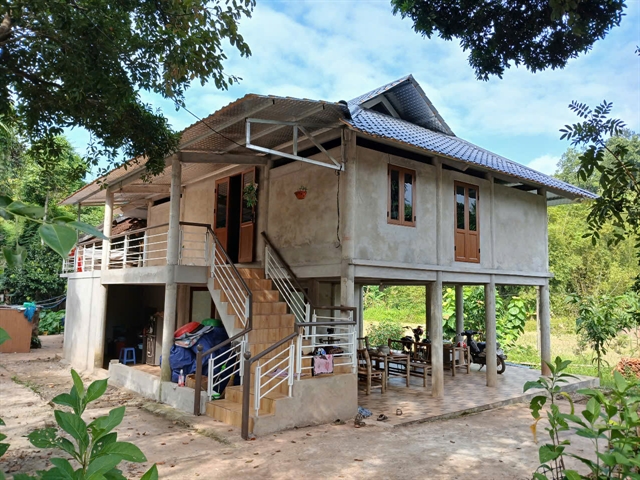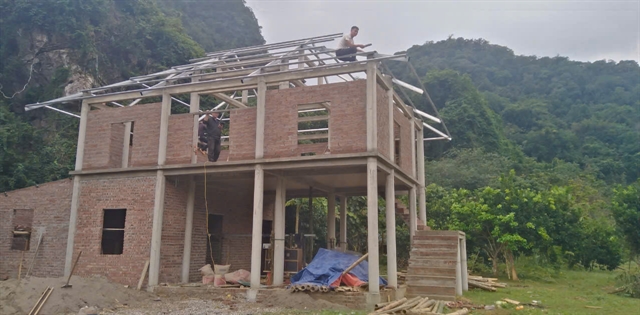A new home, a fresh start for the poor in Hòa Bình
Society – Economy - Ngày đăng : 08:54, 03/12/2024
 |
| Bùi Văn Sớ’s newly built home, funded through the government’s campaign to eradicate makeshift and dilapidated housing. — VNS Photo Đoàn Tùng |
Minh Hằng
HÒA BÌNH — For 73-year-old war veteran Bùi Văn Sớ, life has turned a new page.
After years of enduring the decaying walls and leaking roof of his family’s old house, he wakes up each morning in a sturdy, spacious home that feels almost too good to be true.
“I was overwhelmed with joy when I found out my family was eligible for support to build a new house,” Sớ said.
The Mường ethnic resident of Lũy Ải Village, Phong Phú Commune, Tân Lạc District, has been bedridden for three years due to illness.
“I can no longer work and all responsibilities have fallen onto my children and grandchildren. This house has truly brought happiness to us, even though we still face many difficulties.”
The new home, built with VNĐ70 million (US$2,750) in government support, is more than just a shelter - it is a lifeline.
To complete the construction, Sớ’s children borrowed money from relatives and a bank, while the community rallied around them.
Local authorities called on villagers to assist in the building process, proving that solidarity can achieve remarkable things.
Sớ’s story is part of a larger, inspiring initiative in the northern province of Hòa Bình.
He is one of the thousands of impoverished households benefiting from a national campaign to eradicate makeshift and substandard housing by 2025. This ambitious effort, dubbed 'Joining hands to eradicate makeshift housing', has transformed not just homes, but lives.
Ngòi village in Suối Hoa Commune, Tân Lạc District, is a microcosm of this housing revolution.
Here, ten impoverished families - many of them elderly or struggling with health issues - have each received VNĐ50 million ($2,040) to construct new homes.
“We made sure no one was overlooked,” said Đinh Công Hoán, Secretary of the hamlet’s Party Committee.
“Local authorities went door-to-door to understand each family’s situation and ensure fairness in selecting beneficiaries.”
 |
| Prime Minister Phạm Minh Chính (left) launched the construction of solidarity houses in Cao Sơn Commune, Đà Bắc District in April this year. — VNA/VNS Photos |
But financial aid was just one part of the effort.
“We also mobilised villagers and local resources to help with construction,” he added. This community-first approach has accelerated progress: seven of the ten houses are set to be completed by the end of 2024, with the remaining three ready early in 2025.
The campaign has brought joy, but the support is not enough to build a new house.
“Some families sold livestock or even land to afford the additional costs,” said Hoán.
But the sense of hope and determination is unmistakable, as the community edges closer to its goal of eradicating substandard housing ahead of the national deadline.
Đà Bắc District has distinguished itself as a leading local area in implementing the provincial initiative to eliminate makeshift and dilapidated housing for impoverished households. Recognising this as a vital component of poverty alleviation, district authorities have made it a top priority, mobilising resources to provide transparent and equitable housing support.
Local Party committees and authorities have conducted extensive reviews of housing conditions, engaging directly with struggling households to address their needs and offer effective solutions.
In response to the Prime Minister Phạm Minh Chính’s nationwide call on October 9 to eradicate makeshift housing by 2025, Hòa Bình Province has received VNĐ43.6 billion in donations.
Of this, VNĐ33.6 billion is managed by the provincial Fatherland Front, with contributions from nine businesses within and outside the province.
From January to now, 50 organisations have contributed over VNĐ37.38 billion to the fund for the poor. These funds have supported the construction of 221 new solidarity houses, valued at over VNĐ11 billion, alongside other social welfare initiatives.
Vice Secretary of the provincial Party Committee and chairman of the provincial People’s Committee, Bùi Văn Khánh, highlighted the campaign’s profound social and humanitarian significance.
He noted that the movement aligns with key national policies to “Leave no one behind” and foster societal unity.
 |
| A house under construction in Ngòi village, Suối Hoa Commune, Tân Lạc District. |
Currently, Hòa Bình has over 20,000 impoverished households, including over 6,000 living in substandard housing.
Since the beginning of 2024, the province has allocated VNĐ24.6 billion to build 492 new homes, providing safer and more stable living conditions for vulnerable families.
Chairman Khánh expressed confidence in the collective efforts of local authorities, businesses and the public to sustain and accelerate the campaign. He emphasised that the movement’s success would create a ripple effect, improving lives across the province and ensuring that no one is left behind.
By the end of 2025, the province aims to eliminate makeshift homes for 2,640 households. This includes building 1,803 new homes in 2024 and repairing 837 more in 2025, requiring a budget of VNĐ106.89 billion.
Deputy director of the provincial Department of Labour, War Invalids and Social Affairs, Nguyễn Đức Tuyên, highlighted the collaboration powering the campaign.
“We’ve partnered with organisations like the Việt Nam Fatherland Front and local authorities to ensure fair and transparent support,” he said.
“However, challenges loom. Funding is limited, land-use regulations are complex, and some ethnic minority communities face delays due to traditional beliefs about auspicious construction times.”
In response, Hòa Bình has requested additional government support to expand the programme to 3,936 households. The proposal seeks VNĐ60 million per new home and VNĐ30 million per repair, with an overall budget of VNĐ198.72 billion.
Beyond bricks and mortar, the housing initiative is part of a broader vision to help families escape the cycle of poverty.
Provincial leaders are also implementing national programmes to promote sustainable economic growth for poor and near-poor households.
These efforts include reviewing land use for development and mitigating disaster risks in vulnerable areas. Memories of the devastation caused by tropical storm Yagi remain fresh, driving urgency to prevent similar tragedies, Tuyên said.
For families like Sớ’s, a new home represents more than safety. It is a foundation for hope and stability - a place where the next generation can dream bigger.
And as Hòa Bình moves closer to its 2025 goal, it’s clear that this campaign is not just about building houses. It’s about rebuilding lives, one family at a time. — VNS
